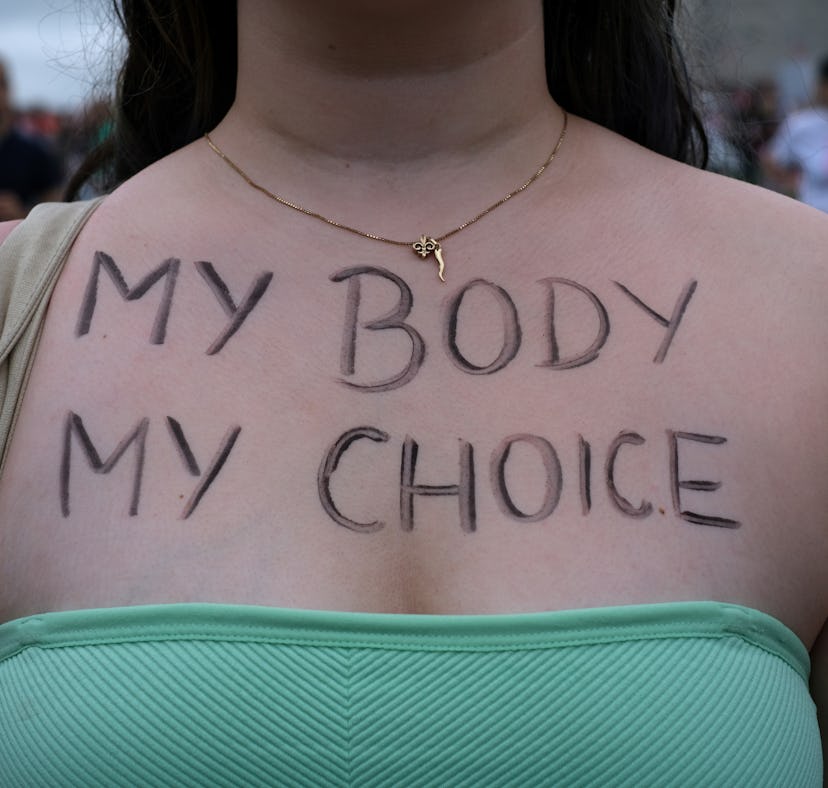
If Roe Falls, Here’s What Abortion Access On College Campuses Might Be Like
Options will really depend on where you live.
On May 2, a leaked draft ruling in the Supreme Court case Dobbs v. Jackson prompted waves of concern among reproductive health care advocates. The draft decision, which was penned by Justice Samuel Alito, would essentially overturn two landmark abortion cases: 1973’s Roe v. Wade, and 1992’s Planned Parenthood v. Casey. If you’re a college student, parent, or faculty member, you might be wondering — if Roe falls, will abortion, particularly medication abortion, be available on college campuses? Well, medication abortion is actually not widely accessible on campuses even now.
“Medication abortion” refers to a nonsurgical method used to terminate a pregnancy, and typically involves taking two prescription pills — mifepristone and misoprostol — in order to induce a miscarriage. Only one state currently has a requirement on the books mandating public colleges and universities to offer medication abortions on their campuses, and that’s California. The legislation, signed in 2019, is slated to take effect in 2023. Legislators in Massachusetts are advocating for a similar law in their state, to cut down travel times and expenses for students who currently have to go off campus for abortion care. However, Rutgers University in New Jersey is the only college outside California that has publicly confirmed it currently offers medication abortions on campus.
Carrie N. Baker, Ph.D., is a professor of the study of women and gender at Smith College, and Massachusetts lawmakers have used her research on the barriers students face when seeking abortion care in ongoing legislative efforts. While she can’t speak to each of the approximately 6,000 accredited colleges and universities across the United States, she thinks that most campuses don’t offer medication abortion as part of their student health offerings. “Until recently — until COVID — there was a lot of red tape around access to medication abortion because the FDA put it under a drug safety program called REMS, which stands for Risk Evaluation and Mitigation Strategies,” Baker tells Elite Daily. But in December 2021, the FDA expanded access to medication abortion across the country by allowing patients to receive medication abortion pills via mail.
So if the Dobbs decision does in fact overturn Roe v. Wade, would this change the current landscape of medication abortion access on college campuses specifically? Perhaps not as dramatically as you might think — in states like California and Massachusetts, Baker says, there are already abortion protections codified in state laws, which makes it unlikely that college campuses that currently (or that might in future) offer medication abortions in these states would suddenly stop doing so. But everywhere else in the country, the question of medication abortion access on campus is the same as if you were at home.
“If Roe is overturned,” Baker says, “about half the country will make abortion illegal — and that includes medication abortion.” According to the Guttmacher Institute, at least 26 states would be certain or likely to ban abortion if the Supreme Court were to strike Roe down. Thirteen of these states, including Arkansas and Louisiana, have “trigger laws” that would automatically ban abortion if Roe disappeared. On the other hand, many states actively protect abortion access, but people seeking medication abortions in those states may also be impacted by a potential overturning of Roe.
“States like Massachusetts have an affirmative right to abortion in our law, and many states do, like California and New York and Connecticut,” Baker says. “In those states, abortion will still be available, including medication abortion, but people from the states where abortion is made illegal will travel to the states where it’s legal. And so for people in states where it’s legal, waiting periods will get longer.”
The other thing to keep in mind, Baker adds, is that “medication abortion under the FDA rules can only be used in the first 10 weeks of pregnancy. So if you can’t get an appointment for multiple weeks, potentially you won’t be able to use medication abortion.” If that happens, patients seeking abortion care would have to undergo surgical abortions instead. (The World Health Organization (WHO), meanwhile, recommends medication abortions within the first 12 weeks of pregnancy.)
Unless you attend a public university in California, your access to medication abortions in a post-Roe United States would largely be determined by your state’s abortion laws and your ability to travel if needed. But while we wait for the Supreme Court to make a final decision in the Dobbs case, Baker says there are a few useful resources college students (and others seeking medication abortions) can access if you live in a state that allows you to do so. One example is Aid Access, a service launched by Dutch doctor Rebecca Gomperts, which ships abortion pills to all 50 U.S. states and Washington, D.C. Another is Plan C, which connects pregnant people with clinics, telehealth services, and online pharmacies to help them find abortion pills and provides them with the necessary resources to self-manage an abortion at home.
At the time of publication, these services are legal from the FDA’s perspective, but states like Texas are attempting to ban self-managed abortions. According to Advancing New Standards in Reproductive Health (ANSIRH), which is based out of the University of California, San Francisco, medication abortions via abortion pills are safe and effective. While complications are rare when using abortion pills, per ANSIRH, you should definitely seek medical attention if you experience any complications.
The decision in Dobbs v. Jackson is expected in late June or early July.
This article was originally published on